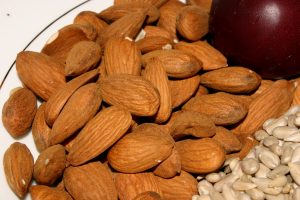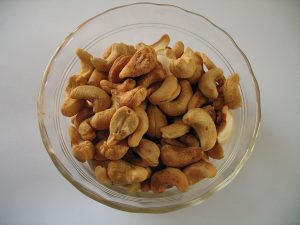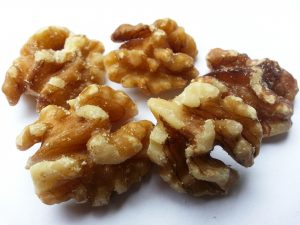 When I work with clients, many of them are surprised when I suggest that they add nuts to their meal plans. They often ask, “Aren’t nuts fattening?”. Yes, nuts contain a good quantity of fat, however much of that fat is the heart healthy mono- and polyunsaturated kinds.
When I work with clients, many of them are surprised when I suggest that they add nuts to their meal plans. They often ask, “Aren’t nuts fattening?”. Yes, nuts contain a good quantity of fat, however much of that fat is the heart healthy mono- and polyunsaturated kinds.
The great thing about nuts is that they not only contain the good kinds of fat, but they are also a great source of protein and fiber. The combination of fat, protein and fiber is a powerhouse for increased satiety. Adding nuts to your meals and snacks can help you feel full for longer periods of time, which can be a huge benefit for those struggling with weight management. The biggest catch when using nuts, is that you have to really watch your portion sizes. But thankfully, a little amount can go a long way for overall health benefits. I often suggest to clients that they substitute nuts for other foods that are high in saturated fats.
“Eating 1.5 oz. per day of most nuts as part of a diet low in saturated fat and cholesterol may reduce the risk of heart disease”, according a U.S. Food and Drug Administration approved Qualified Health claim. Some examples of these heart healthy nuts include: walnuts, almonds, hazelnuts, pistachios, pecans, and some pine nuts. One 50g (about 1.5oz) serving of these kinds of nuts contains only 4 grams of saturated fat. While nuts are healthy and nutrient dense, they are also calorie-dense. Caloric values for nuts range from 160 calories per ounce to 200 calories per ounce, so they must be used wisely.
Below are some fun facts about nuts:
 Almonds: Excellent source of vitamin E and folate while also providing calcium and magnesium. A great nut for your immune system, heart and bones.
Almonds: Excellent source of vitamin E and folate while also providing calcium and magnesium. A great nut for your immune system, heart and bones.
Brazil Nuts: 1 serving contains 100% of daily value for selenium (a mineral with great antioxidant properties).
Cashews: Excellent source of copper and magnesium which benefits the transport of iron in your body and your heart.
Hazelnuts: Rich in monounsaturated fatty acids and an excellent source of vitamin E, copper and magnesium.
Macadamias: Careful, as this nut is high in fat at 22g per 1 oz. serving, however 17g are heart healthy monounsaturated fat. It is also a good source of manganese which is good for bony and connective tissues, growth and reproduction, and carbohydrate and fat metabolisms.
 Pecans: Rich in monounsaturated fatty acids and antioxidants.
Pecans: Rich in monounsaturated fatty acids and antioxidants.
Pine Nuts: Good source of vitamin E and phosphorus, which is good for your immune system and bones.
Pistachios: Contain the antioxidants, lutein and zeaxanthin which benefit your eyes.
Walnuts: Rich in antioxidants and an excellent source of alpha-linolenic acid, which is the plant-based form of omega-3.

0 Comments